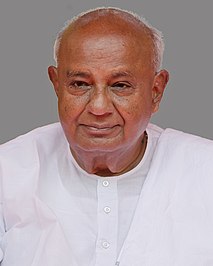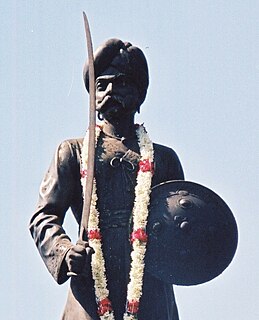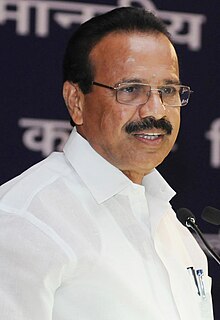
Haradanahalli Doddegowda Deve Gowda is an Indian politician and former Prime Minister of India from 1 June 1996 to 21 April 1997. He was previously the 14th Chief Minister of Karnataka from 1994 to 1996. He presently is a Member of Parliament in the Rajya Sabha representing Karnataka.

Somanahalli Mallaiah Krishna is an Indian politician who served as Minister of External Affairs of India from 2009 to October 2012. He was the 16th Chief Minister of Karnataka from 1999 to 2004 and the 19th Governor of Maharashtra from 2004 to 2008. SM Krishna had served as the Speaker of the Karnataka Vidhan Sabha from December 1989 to January 1993. He was also a member of Lok Sabha and Rajya Sabha at various times from 1971 to 2014.

Nadaprabhu Hiriya Kempe Gowda, also known as Kempe Gowda was a chieftain under the Vijayanagara Empire. The city of Bengaluru, capital of the Indian state of Karnataka, was fortified by Kempe Gowda in 1537. He erected many Kannada inscriptions in the Kannada Country.
Hegde is a surname from Karnataka, India. It is found amongst Hindus of the Bunt community, Goud Saraswat Brahmins, Havyaka Brahmins, Vokkaligas and Kurubas in Karnataka.
Vokkaliga is a community, or a group of closely-related castes, from the Indian state of Karnataka. They are also present in the neighbouring state of Tamil Nadu.
The Nayak, NaikandNayaka is a historic Indian title conferred on Sardars, who were governors of feudal states in the Middle Ages. Today it is also a surname.

Nayakas of Keladi (1499–1763), also known as Nayakas of Bednore and Ikkeri Nayakas, were an Indian dynasty based in Keladi in present-day Shimoga district of Karnataka, India. They were an important ruling dynasty in post-medieval Karnataka. They initially ruled as a vassal of the famous Vijayanagar Empire. After the fall of the empire in 1565, they gained independence and ruled significant parts of Malnad region of the Western Ghats in present-day Karnataka, most areas in the coastal regions of Karnataka, and parts of northern Kerala, Malabar and the central plains along the Tungabhadra river. In 1763 AD, with their defeat to Hyder Ali, they were absorbed into the Kingdom of Mysore. They played an important part in the history of Karnataka, during a time of confusion and fragmentation that generally prevailed in South India after the fall of the Vijayanagar Empire. The Keladi rulers were of the Vokkaliga and Banajiga castes and were Veerashaivas by faith. The Haleri Kingdom that ruled over Coorg between 1600 A.D and 1834 A.D. was founded by a member of the Keladi family.
Vokkaliga or Gowda is a Hindu community of people concentrated in south central areas of Karnataka. Some Idigas are involved in soma and Ayurvedic medicine.

Devaragunda Venkappa Sadananda Gowda is an Indian statesman who was the Minister of Chemicals and Fertilizers and Statistics, Programme Implementation of India in the Second Modi ministry, representing the Bangalore North constituency. He also held Ministry of Railways and other cabinet positions in the First Modi ministry. He also served as the 20th Chief Minister of Karnataka.

Shantaveri Gopala Gowda was a socialist politician who was thrice elected to Karnataka Vidhanasabha, the Legislative Assembly of Karnataka, in 1952, 1962 and 1967.
Reddy/Reddi is an Indian surname. In India it is predominantly used by members of the Telugu speaking Reddy caste. It is also used as a surname by members of the Reddi Lingayat and Reddy Vokkaliga communities of Karnataka.

Kunchitiga are a community of people from Karnataka, India. They are mostly concentrated in Tumkur, Bangalore, Mysore, and Chitradurga districts. They are also found in the neighbouring state of Tamil Nadu.
Tulu Gowda and Kodagu Gowda (Gauda) are primarily found in South Canara District, Kodagu District, Indian state of Karnataka and Bandadka village of Kasaragod. They are a subsect of the Vokkaliga community but are culturally and linguistically different. They speak Tulu and Arebhashe.
Gowda is a surname native to the Karnataka state of India. It is mainly found among the Vokkaligas in south Karnataka, and the Lingayats in north Karnataka. It is also used by Kurubas.
Grama Vokkaliga is a sub group of Vokkaliga community of Karnataka residing in Uttara Kannada district. The people from this community are situated in the coastal area, namely Honnavar and Kumta, and highlands namely Siddapur and Sirsi of Uttara Kannada district. In Honnavar, Siddapur and Sirsi they are being called by the surname Gowda and in Kumta by Patagar/ Patgar.

Mothakapalli Venkatarama Krishnappa was an Indian politician belonging to the Indian National Congress, he was elected to the Lower House of Indian Parliament the Lok Sabha from Kolar in 1952 from Tumkur 1957 and 1962 and from Hoskote in 1967 and 1971 from Mysore State and from Chikballapur in Karnataka in 1977.
Yashodhara Dasappa was an Indian independence activist, Gandhian, social reformer and a Minister in the state of Karnataka. She was politically aligned with the Indian National Congress and served as a Minister in the Karnataka state governments headed by S. R. Kanthi (1962) and S. Nijalingappa (1969).

Malavalli Venkatappa Chandrashekara Murthy, sometimes spelled M. V. Chandrashekhara Murthy, was an Indian Union Minister of State for Finance and a member of parliament representing Kanakapura of Karnataka State in the 6th, 7th, 8th, 9th, 10th and 13th Lok Sabhas.

M. V. Venkatappa (1932–2013) was an Indian politician from the state of Karnataka. He was born in a Vokkaliga family. Venkatappa was the Karnataka Legislative Assembly speaker from 1999 to 2004, as MLA from Mulbagal.









